Khamenei Reiterates Call On Athletes Not To Play Against Israelis

Iran’s Supreme Leader Ali Khamenei has called on sportsmen to adhere to “religious beliefs,” reiterating that not competing with Israeli athletes is a victory.

Iran’s Supreme Leader Ali Khamenei has called on sportsmen to adhere to “religious beliefs,” reiterating that not competing with Israeli athletes is a victory.
He made the remarks about a month ago in a meeting with families of the “martyred” athletes but was published by its official website on Monday.
Deprivation of athletes of medals due to a ban on competing with the representatives of “the Zionist regime” is actually a victory because competing means recognizing the regime, he noted.
There is no legislation banning athletes but under pressure from federation officials, they usually lose games intentionally, forfeit matches or claim injury to avoid facing Israelis. Khamenei has often praised Iranian athletes who refuse to play against Israelis, and in September 2021 said they should continue to do so even if facing punishment by international sports bodies.
About 30 Iranian athletes in recent years have defected from Iranian national teams and sought asylum in other countries, including Judo champion Saeid Mollaei, Greco-Roman national team wrestler Ali Arsalan, and many others.
Pointing to the prominent role of popular sport figures in different strata of society, Khamenei said observance of religious teachings by the athletes and sports managers has a great social and spiritual impact on people. There is no Muslim religious rule against competing with Israelis.
Amid widespread protests by the Iranians against Khamenei, the government, and the Islamic regime, many officials are trying to boost the discourse of theocracy in the society.

Amid ongoing crisis in Iran ‘reformist’ commentator Abbas Abdi has said in an interview that what Iran's state-run television broadcasts is sheer propaganda."
Those who are looking for news in Iran will not turn to the state TV, Abdi argued.
Ironically, when hackers interrupted the state TV news program October 8, playing a short clip, most Iranians found out about it through social media reports or on foreign-based satellite TV rather than watching the actual program on the state TV.
Meanwhile, former Vice President Mostafa Hashemi Taba has argued in another interview that the state TV, also known as the Islamic Republic of Iran's Broadcasting organization (IRIB) excels in keeping Iranians uninformed about developments. He added that Iranians no longer trust the state television and the officials who appear on TV.
"When the television broadcasts what only a tiny segment of the population believes, others will inevitably turn their TV sets off and turn their backs to it."
Meanwhile, former IRIB Chief Mohammad Hashemi also criticized IRIB for airing the news only after they have been broadcast on foreign-based satellite channels. Nonetheless, he praised the state TV for countering lies and rumors, without citing an example.
According to Didban Iran [Iran Monitor] website in Tehran, the activity of IRIB's deputy chief for political affairs, which is in charge of news has been reduced to responding to information programs that foreign-based Persian media broadcast about Iranian developments.
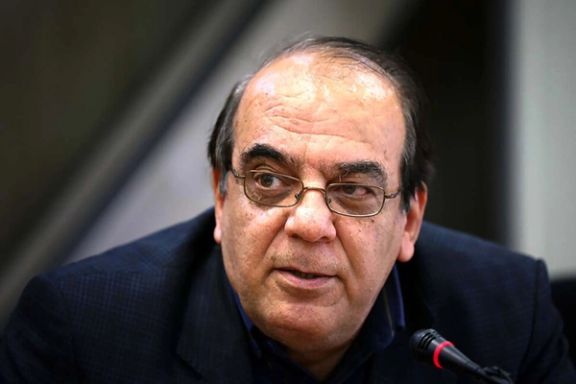
IRIB is directly controlled by Supreme Leader Ali Khamenei’s office, especially its news and political programming.
The state broadcaster usually repeats what has already been aired during previous hours and sometimes days, adding a spin to please the organization's management and its supreme chief, Khamenei.
During the three weeks since the start of antigovernment protests in Iran, IRIB's most eye-catching output was showing the half-naked image of an Iranian protester abroad, for which the organization was forced to apologize later. It was meant to help the regime’s cause by discrediting protesters, but it touched a raw religious nerve among some insiders.
IRIB’s penchant for one-sided news has deeply annoyed viewers who currently get their news from social media and Persian-speaking satellite TV channels based in Europe and the United States. The viewers no longer trust the media that belongs to and echoes the voice of a government they have ceased to trust for the same reason: Unilateralism, justifying and beatifying the government's often wrong measures and its police brutality in the streets.
IRIB Chief Payman Jebelli has described the organization as "the regime's media outlet," an expression that was also used later by former President Hassan Rouhani. The same thing was said even more elaborately by the chairman of the state TV office in Khorasan Province Mohsen Nasrpour who stated, "the state TV is the mouthpiece of the government and the regime."
This was most recently reiterated by Hashem Hosseini Bushehri, a senior cleric, during a meeting with Jebelli on October 8. According to the Qom Seminary's official website, Bushehri said: "IRIB is the official podium for the Islamic Republic regime."
The people who have been chanting slogans in the streets of almost all major Iranian cities during the past three weeks, saying that they no longer want the Islamic Republic, are not likely to be interested in the same regime's mouthpiece. Following the hacking on Saturday, an Iranian Twitter user commented: "Thank you. Next time, please unplug the entire state television."
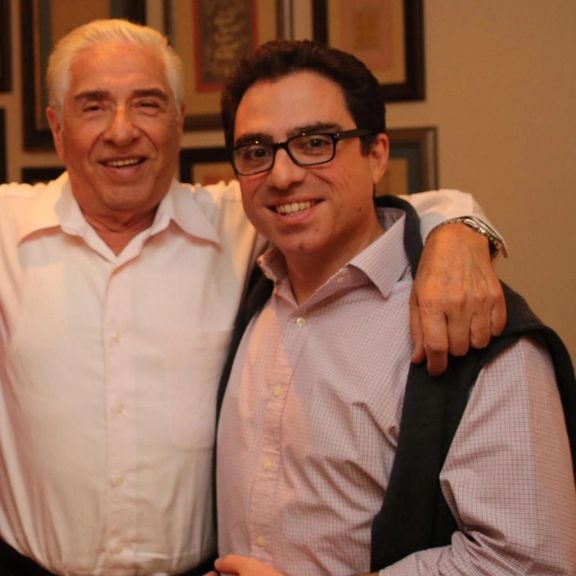
The furlough of Iranian-American citizen Siamak Namazi, who is held hostage in Iran over espionage charges, has been extended for another three days.
Babak Namazi, Siamak's brother, made the announcement in a statement on Saturday, expressing hope that his brother's 10-day leave will lead to his permanent release from prison.
Namazi has spent seven years in jail on trumped-up espionage charges. His father, who went to Iran to free him in 2016, was also arrested and accused of espionage.
Last week, Bagher (Baquer) Namazi, Siamak’s father, finally left Iran after 6.5 years of detention, and Siamak was let out of prison for a furlough. The United States that has been demanding freedom for four citizens held Iran said that Namazi’s release was not part of deal.
Tehran has it will receive $7 billion of its frozen funds for a prisoner exchange deal with the United States, but it did not specifically claim that the money is related to the Namazis.
The United States said last week that reports from Iranian sources of a transfer of funds related to the release of Bagher and the furlough for his son are categorically false.
United Nations spokesperson Stephane Dujarric announced about Namazis in a statement on Saturday, October 1, but the Islamic Republic periodically announces that release of its frozen funds is imminent to prop up its currency.
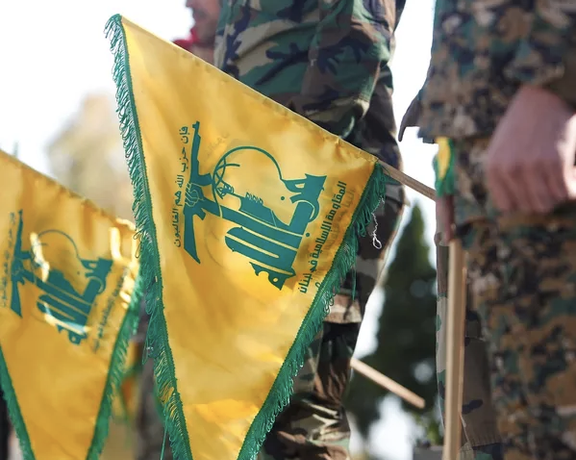
Lebanon's Iran-backed group Hezbollah is using all its propaganda tools to show support for the Islamic Republic and misrepresent the current nationwide protests in Iran.
Trying to show the realities in Iran differently and discredit the protests, Hezbollah organized rallies in support of the regime in Tehran with students from its private educational system – the Mahdi schools.
Lebanese activists have published videos of children from Al-Mahdi schools carrying photos of Supreme Leader Ali Khamenei and Qasem Soleimani, the slain commander of Quds force, the extraterritorial wing of Iran’s Revolutionary Guard.
Hezbollah held ceremonies at the schools in which children were used to show "obedience to religious authority" and “condemning the Western conspiracy” against the Islamic Republic and its "achievements," the Lebanese website al-Modon reported.
Mahdi schools are a cornerstone of Hezbollah’s “Society of Resistance,” featuring a standard modern technology-heavy curriculum mixed with its Islamic doctrine.
Iran has been engulfed in widespread antigovernment protests since September 19, after Mahsa Amini, a 22-year-old woman was killed in the custody of hijab police.
Oslo-based organization Iran Human Rights said on Saturday that at least 185 people have been killed in the uprising ignited by the death in custody of 22-year-old Mahsa Amini. The NGO added that about 20 of the killed were minors.
The protests first erupted in Mahsa Amini’s hometown Saqqez and capital Tehran and soon spread to all over the country and garnered support from Iranian expatriate communities around the world as well as foreign governments and officials.
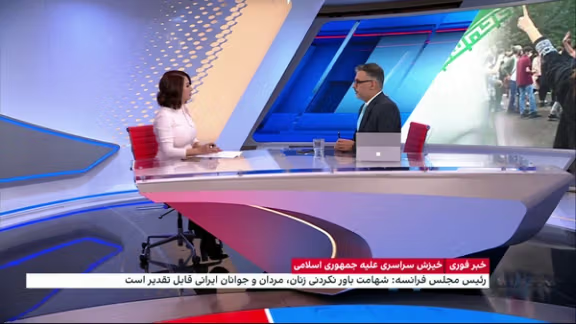
A senior Iranian lawmaker has asked the government to pursue legal complaints against Iran International TV for its coverage of protests that “invited riots.”
Mohammad-Taghi Naghdali (Naqdali) the secretary of Islamic Republic parliament’s legal and judicial committee, and a hardliner cleric, called on the government and the foreign ministry, October 8, to “use capabilities in the international arena” to take steps against Iran International and similar networks that “make calls for riots, destruction of property and regime change.”
Tens of millions of Iranians rely on social media and satellite TV channels to receive news and information that Iranian government-controlled media deny them. Iran International, BBC Persian, Manoto TV and US financed media beam programs to Iran that provide news, which is censored in local media by the government and its intelligence organs.
As protests began in Iran in mid-September, authorities severely restricted Internet and social media access, leaving the population to rely more on foreign-based television stations for news and information.
The Iranian government has tightly controlled media for over four decades, shutting down hundreds of newspapers and has jailing around 860 journalists over the years.
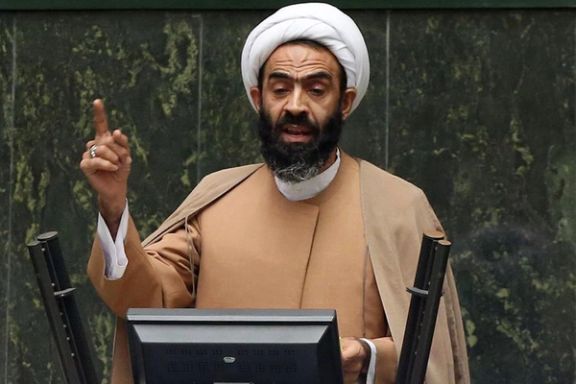
The Iranian government has been putting pressure on foreign-based Persian speaking media organizations for over a decade. First, websites of Radio Farda, BBC Persian and Voice of America were blocked in early 2003, before Iran International was established. Both radio and TV signals have been jammed and any contact with these media outlets have been punishable by lengthy prison terms.
In 2020, the Iranian judiciary announced confiscation of the properties of those journalists who had left the country and were working for Iran International.
In 2019, Iran’s ambassador in the United Kingdom had lodged a complaint to the British media watchdog Ofcom against the network which is based in London.
In March 2019, Ofcom dismissed the complaint, which related to a specific interview, saying that the network adhered to its guidelines.
At the time, Iran International representatives told the Guardian that the channel “provides fair, balanced and impartial coverage, and abides by its published Editorial Guidelines”, adding that it “covers the widest range of opinions of interest to all Iranians and Farsi speakers”.
However, Tehran continued its attacks against Iran International. In a statement released in November 2019, Iran's Intelligence Ministry said working for the network was "proof of collaboration in terrorist actions with the enemies of Iran" and claimed that it has arrested a number of individuals on charges of sending information to Iran International.
In his attack on the network, the Iranian lawmaker Naghdali specifically mentioned Ofcom, asking the government to take advantage of the watchdog’s existence, which he said “can be used by the foreign ministry and the Judiciary” to go after Iran International.
Iran International dismissed the claims of Mohammad-Taghi Naghdali on Sunday, saying that it adheres to OFCOM broadcasting guidelines. The network said its news coverage provides a platform to Iranian commentators, human rights defenders and civic activists to discuss vital social and political issues.
“Sadly, freedom of the press is denied to Iranian citizens in Iran. They are denied their voice by the Iranian government’s tightly controlled media,” the network's General Manager Mahmood Enayat said.
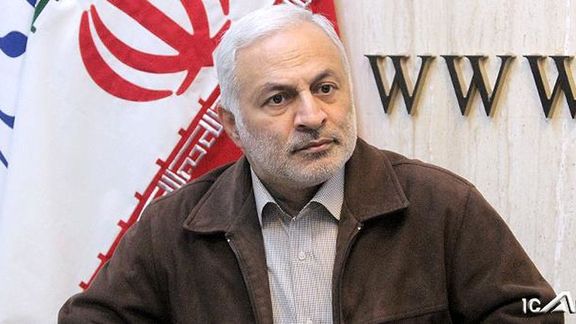
An Iranian lawmaker says the authorities have shut off Internet access in the country because of the role foreign-based Persian TV channels play in the current uprising.
Vahid Jalalzadeh, the chairman of the National Security Committee of the Iranian parliament, said on Saturday the Islamic Republic will provide Iranians with access to the Internet if the European countries cut off “anti-Iran” networks in cyberspace.
Late in September, Iran’s foreign ministry had summoned the British ambassador in Tehran over what it called “a hostile atmosphere” created by London-based Persian media outlets. There are three London-based major Iranian satellite TV channels beaming programs into Iran; Iran International TV, Manoto TV and BBC Persian.
After protests began in mid-September the Biden Administration pledged to help the people in Iran to circumvent Internet filtering as well as providing alternative methods of connectivity as opposed to traditional land and phone line internet.
The US Senate Foreign Relations Committee is now considering a bill to support global Internet freedom, following government disruption of access in Iran amid protests.
Authorities disrupt the Internet to prevent news of unrest reaching the rest of the country and abroad, and to prevent protesters from galvanizing support in nearby regions.
Amid heightened restrictions on Internet access following nationwide antigovernment protests, Iranians’ use of VPNs has risen over 3,000 percent in the previous month.